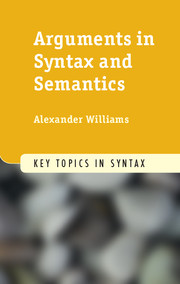12 - Passives
Published online by Cambridge University Press: 05 January 2015
Summary
INTRODUCTION
This chapter is about the demoted deep-subject role in passives. In (1) this is the Stealer role bound by Lee. In (2) the same role is unrealized.
(1) The necklace was recently stolen by Lee.
(2) The necklace was recently stolen.
My focus will be on the common view that this role is linked to an argument, realized by the by-phrase in (1), silent but grammatically present in (2). In Section 12.4, I discuss the mechanics of this view, as executed in several different analyses; I also sketch the opposing view, and bolster it against some initial objections. Section 12.5 is then an extended critique of the best justification for the standard view, namely that we need an implicit syntactic argument to explain data like (3), discussed in Roeper (1987). Relying in part on new observations, and agreeing with Landau (2000), I will conclude that this justification is much weaker than it has seemed.
(3) The ship was sunk to collect the insurance.
‘The ship was sunk so that its sinker might collect the insurance.’
But before this case study of implicit argumenthood, I would first like to say more about the terms “demotion” and “passive” (Section 12.2), and then consider a traditional question of framing (Section 12.3): what sorts of predicates occur in passive clauses?
PASSIVES AND DEMOTION
Passives and actives are satisfied by the same sorts of events. Passive (1) and (2) above, like the active (4), are all satisfied by stealings. Stealings involve a thief, so this role is entailed by all three sentences, as “entail” was defined in Chapter 2.
(4) Lee recently stole the necklace.
The role bound by S in an ordinary active clause is the deep-subject role, or deep-S role, for its verb. In any kind of passive, this role is assigned to neither S nor O. In a long passive, such as (1), it is realized by some other dependent, like the by-phrase in English.
- Type
- Chapter
- Information
- Arguments in Syntax and Semantics , pp. 273 - 306Publisher: Cambridge University PressPrint publication year: 2015



